Get free scan and check if your device is infected.
Remove it nowTo use full-featured product, you have to purchase a license for Combo Cleaner. Seven days free trial available. Combo Cleaner is owned and operated by RCS LT, the parent company of PCRisk.com.
What is onlinecontent[.]fun?
Onlinecontent[.]fun is a rogue website, sharing a lot of similarities with mega-deals.mobi, weads32.com, naneso.com and hundreds of others. It operates by generating redirects to unreliable, possibly malicious websites, as well as deliver dubious content (including clickbait) for user consumption.
It is rarely accessed intentionally; most visitors get redirected by clicking on intrusive ads or by having it opened by PUAs (potentially unwanted applications) in their device.
It should be known, that rogue apps do not need express user permission to be installed onto their systems. Once successfully infiltrated, they cause unauthorized redirects, run invasive advertisement campaigns and track data.
![onlinecontent[.]fun pop-up redirects](/images/stories/screenshots201906/onlinecontentfun-homepage.jpg)
Rogue sites are promoted by intrusive adverts (typically hosted by compromised sites). PUAs spread them by force-opening new browser tabs/windows and redirecting users. The onlinecontent[.]fun website's course of action begins with checking visitor's IP (Internet Protocol) address, in order to learn their geolocation.
Once the latter is known, the site either redirects its visitors elsewhere and/or presents them with untrustworthy content. Its misuse of browser notifications is also noteworthy; it disguises the "allow" option beneath clickbait ("I am not a robot/Click on Allow to confirm that you are not a robot").
If consented to these notifications, onlinecontent[.]fun starts running intrusive advert campaigns. Advertisements of this type are deemed dangerous, due to the questionable/malignant websites they redirect to, as well as their ability to execute scripts, designed to make autonomous downloads/installs of PUAs.
Unwanted applications can cause redirects to similarly hazardous sites and run invasive ad campaigns also. By employing a wide variety of tools, they enable third party graphical content. Hence, the adverts they deliver can seriously diminish browsing quality (limit site visibility and browsing speed).
Another ability some PUAs posses is data tracking. By monitoring browsing activity they can gather personal information. What must be understood, is that this data is then passed onto third parties (not unlikely, cyber criminals), intent on misemploying it to generate revenue.
Therefore, PUAs can endanger browser and system integrity (lead to various invasions and infections), as well as personal privacy (even culminate in identity theft). In order to ensure device and user safety, all PUAs must be removed immediately upon detection.
| Name | onlinecontent.fun pop-up |
| Threat Type | Push notifications ads, Unwanted ads, Pop-up ads |
| Serving IP Address | 178.62.225.201 |
| Observed Domains | 0.onlinecontent[.]fun, 1.onlinecontent[.]fun, 2.onlinecontent[.]fun, 3.onlinecontent[.]fun, 4.onlinecontent[.]fun, 5.onlinecontent[.]fun |
| Symptoms | Seeing advertisements not originating from the sites you are browsing. Intrusive pop-up ads. Decreased Internet browsing speed. |
| Distribution Methods | Deceptive pop-up ads, potentially unwanted applications (adware) |
| Damage | Decreased computer performance, browser tracking - privacy issues, possible additional malware infections. |
| Malware Removal (Windows) |
To eliminate possible malware infections, scan your computer with legitimate antivirus software. Our security researchers recommend using Combo Cleaner. Download Combo CleanerTo use full-featured product, you have to purchase a license for Combo Cleaner. 7 days free trial available. Combo Cleaner is owned and operated by RCS LT, the parent company of PCRisk.com. |
There are thousands of PUAs out there and they share plenty of similarities. Most rogue applications offer some sort of "useful" and "beneficial" features, however they are rarely functional. What must be understood, is that the only purpose that PUAs serve is to generate revenue for their developers.
To users, these apps have no genuine value. Instead of delivering on their promises, they cause redirect, run intrusive ad campaigns and gather sensitive information.
How did adware install on my computer?
By clicking on intrusive ads, users can trigger them to make rogue downloads/installs of PUAs. However, these undesirable applications can be inadvertently installed by users themselves, along with desired software. The method of pre-packing ordinary programs with unwanted apps is termed "bundling"; this tactic is widely used by PUA developers.
When installing software: by ignoring terms, possible options, skipping steps and using pre-set settings - users can expose their systems to a variety of invasions and infections. Careless browsing habits can also result in similar outcomes.
How to avoid installation of potentially unwanted applications?
It is highly recommended to only use official and verified sources for all software downloads, ideally via direct download links. Using peer-to-peer sharing networks (e.g. BitTorrent, Gnutella, eMule, etc.) and other third party downloaders - is ill-advised. Programs downloaded from untrustworthy sources are more likely to be bundled with unwanted applications.
Users are strongly encouraged to read installation terms and explore possible options - in order to ensure that they are installing exactly what they intend to, and that the software will operate without endangering users' systems or their privacy.
Using "Custom/Advanced" install settings, opting-out from installing additional apps/features and declining from downloading such from elsewhere - are also amongst installation recommendations. When browsing, users are advised to avoid suspicious sites and suspect ads.
The latter must be stressed, as intrusive advertisements are designed to look utterly legitimate and absolutely harmless. However, a telltale sign of their inauthenticity can be the websites they redirect to (e.g. gambling, pornography, adult-dating and similar).
Should users encounter such adverts/redirects, they should inspect their systems and remove all dubious applications and/or browser extensions/plug-ins. If your computer is already infected with rogue applications, we recommend running a scan with Combo Cleaner Antivirus for Windows to automatically eliminate them.
Appearance of onlinecontent[.]fun website (GIF):
![onlinecontent[.]fun website appearance (GIF)](/images/stories/screenshots201906/onlinecontentfun-appearance.gif)
Instant automatic malware removal:
Manual threat removal might be a lengthy and complicated process that requires advanced IT skills. Combo Cleaner is a professional automatic malware removal tool that is recommended to get rid of malware. Download it by clicking the button below:
DOWNLOAD Combo CleanerBy downloading any software listed on this website you agree to our Privacy Policy and Terms of Use. To use full-featured product, you have to purchase a license for Combo Cleaner. 7 days free trial available. Combo Cleaner is owned and operated by RCS LT, the parent company of PCRisk.com.
Quick menu:
- What is onlinecontent.fun pop-up?
- STEP 1. Remove spam notifications from Google Chrome
- STEP 2. Remove spam notifications from Google Chrome (Android)
- STEP 3. Remove spam notifications from Mozilla Firefox
- STEP 4. Remove spam notifications from Microsoft Edge
- STEP 5. Remove spam notifications from Safari (macOS)
Disable unwanted browser notifications:
Video showing how to disable web browser notifications:
 Remove spam notifications from Google Chrome:
Remove spam notifications from Google Chrome:
Click the Menu button (three dots) on the right upper corner of the screen and select "Settings". In the opened window select "Privacy and security", then click on "Site Settings" and choose "Notifications".
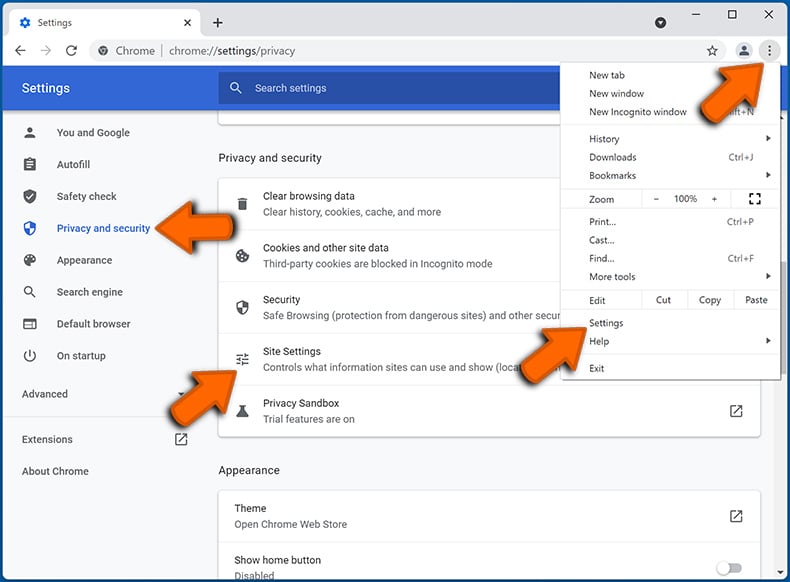
In the "Allowed to send notifications" list search for websites that you want to stop receiving notifications from. Click on the three dots icon near the website URL and click "Block" or "Remove" (if you click "Remove" and visit the malicious site once more, it will ask to enable notifications again).
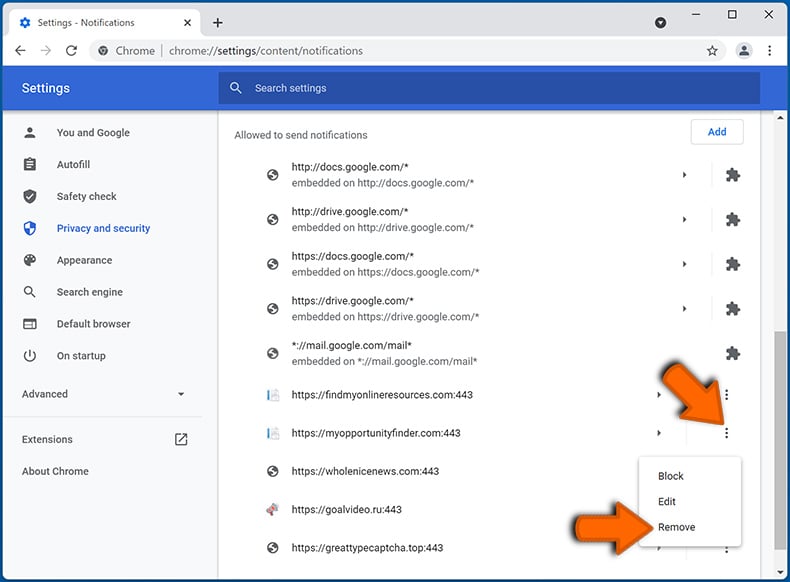
 Remove spam notifications from Google Chrome (Android):
Remove spam notifications from Google Chrome (Android):
Tap the Menu button (three dots) on the right upper corner of the screen and select "Settings". Scroll down, tap on "Site settings" and then "Notifications".
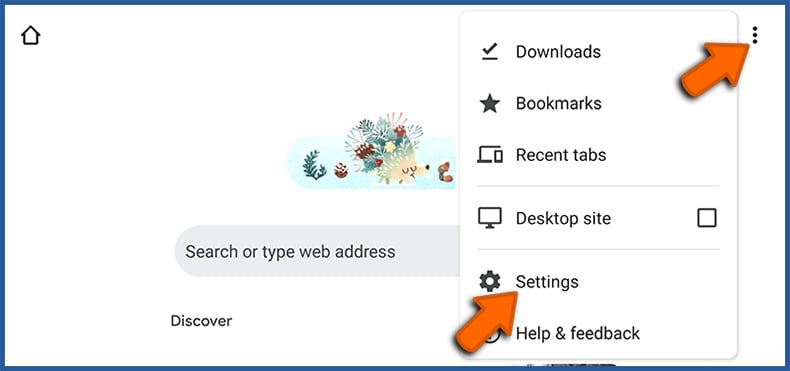
In the opened window, locate all suspicious URLs and tap on them one-by-one. Once the pop-up shows up, select either "Block" or "Remove" (if you tap "Remove" and visit the malicious site once more, it will ask to enable notifications again).
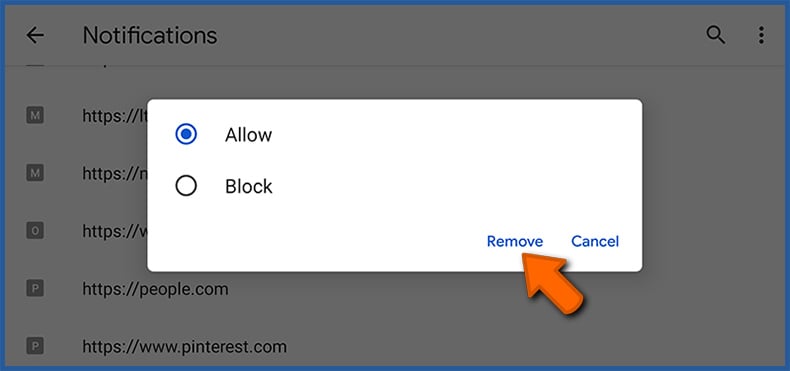
 Remove spam notifications from Mozilla Firefox:
Remove spam notifications from Mozilla Firefox:
Click the Menu button (three bars) on the right upper corner of the screen. Select "Settings" and click on "Privacy & Security" in the toolbar on the left hand side of the screen. Scroll down to the "Permissions" section and click the "Settings" button next to "Notifications".
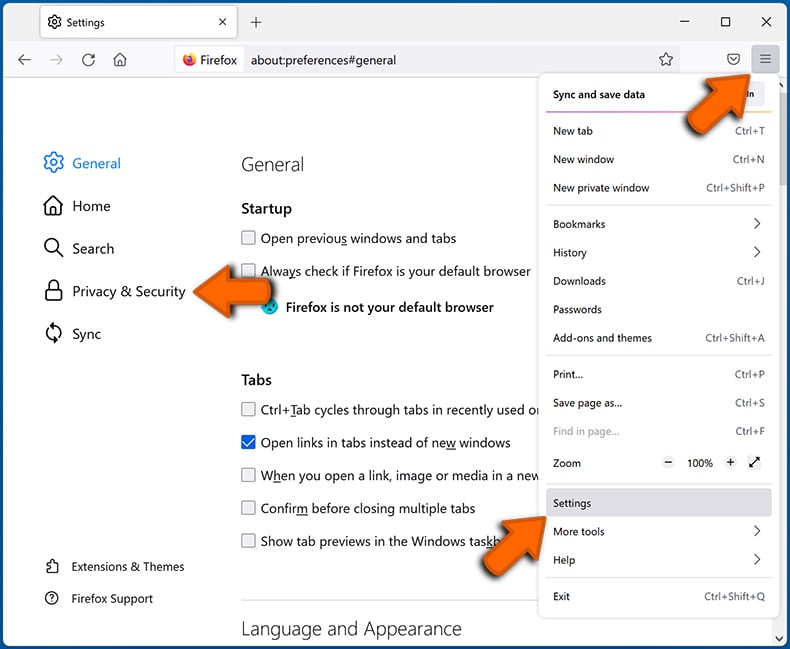
In the opened window, locate all suspicious URLs and block them using the drop-down menu or either remove them by clicking "Remove Website" at the bottom of the window (if you click "Remove Website" and visit the malicious site once more, it will ask to enable notifications again).
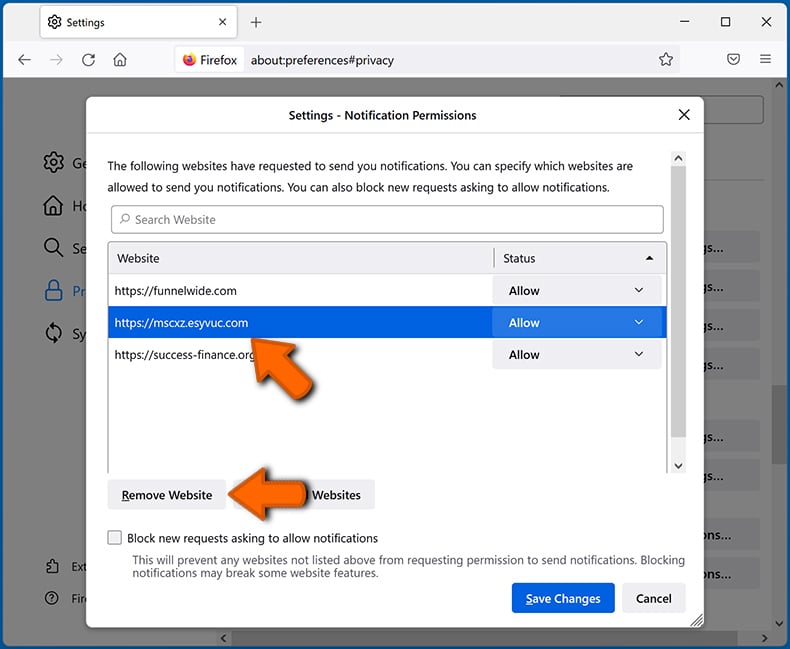
 Remove spam notifications from Microsoft Edge:
Remove spam notifications from Microsoft Edge:
Click the menu button (three dots) on the right upper corner of the Edge window and select "Settings". Click on "Cookies and site permissions" in the toolbar on the left hand side of the screen and select "Notifications".
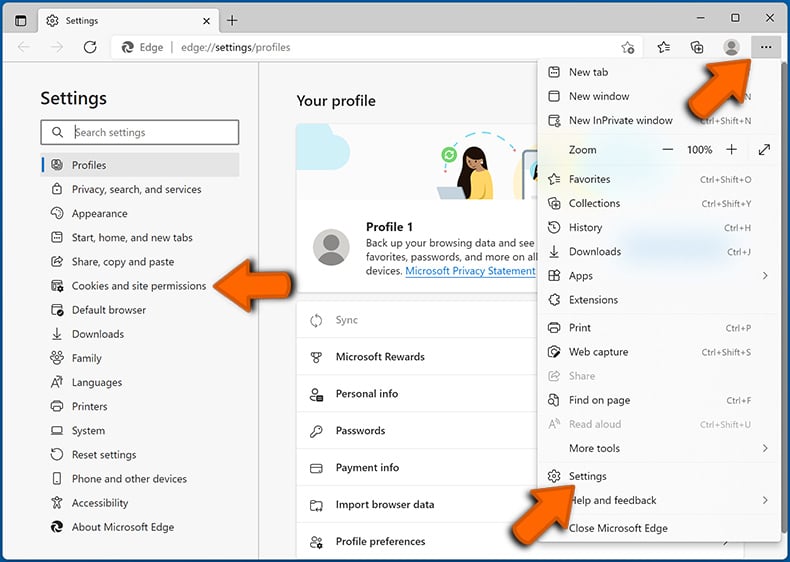
Click three dots on the right hand side of each suspicious URL under "Allow" section and click "Block" or "Remove" (if you click "Remove" and visit the malicious site once more, it will ask to enable notifications again).
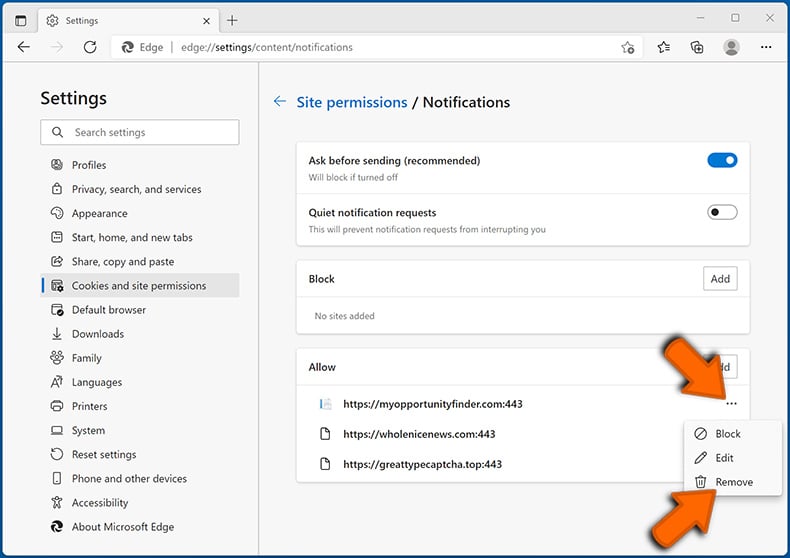
 Remove spam notifications from Safari (macOS):
Remove spam notifications from Safari (macOS):
Click "Safari" button on the left upper corner of the screen and select "Preferences...". Select the "Websites" tab and then select "Notifications" section on the left pane.
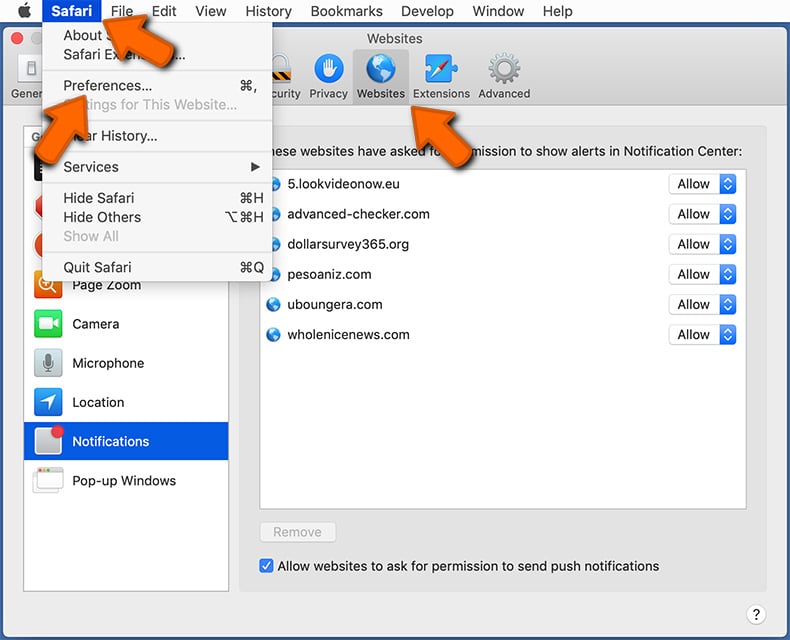
Check for suspicious URLs and apply the "Deny" option using the drop-down menu or either remove them by clicking "Remove" at the bottom of the window (if you click "Remove" and visit the malicious site once more, it will ask to enable notifications again)
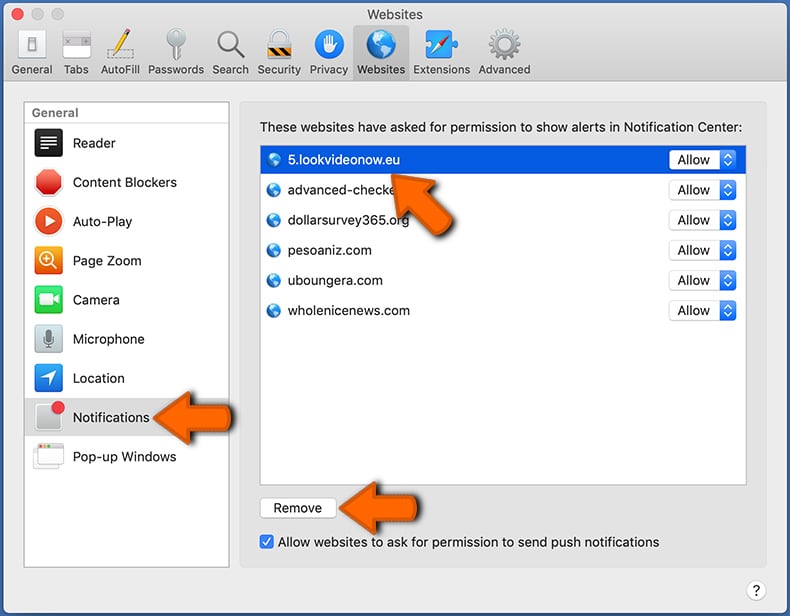
How to avoid browser notification spam?
Internet users should be very skeptical when being asked to allow notifications. While this is a useful feature that allows you to receive timely news from websites you like, deceptive marketers frequently abuse it.
Only allow notifications from websites that you fully trust. For added security - use an anti-malware application with a real-time web browsing monitor to block shady websites that tries to trick you into allowing spam notifications. We recommend using Combo Cleaner Antivirus for Windows.
Share:

Tomas Meskauskas
Expert security researcher, professional malware analyst
I am passionate about computer security and technology. I have an experience of over 10 years working in various companies related to computer technical issue solving and Internet security. I have been working as an author and editor for pcrisk.com since 2010. Follow me on Twitter and LinkedIn to stay informed about the latest online security threats.
PCrisk security portal is brought by a company RCS LT.
Joined forces of security researchers help educate computer users about the latest online security threats. More information about the company RCS LT.
Our malware removal guides are free. However, if you want to support us you can send us a donation.
DonatePCrisk security portal is brought by a company RCS LT.
Joined forces of security researchers help educate computer users about the latest online security threats. More information about the company RCS LT.
Our malware removal guides are free. However, if you want to support us you can send us a donation.
Donate
▼ Show Discussion